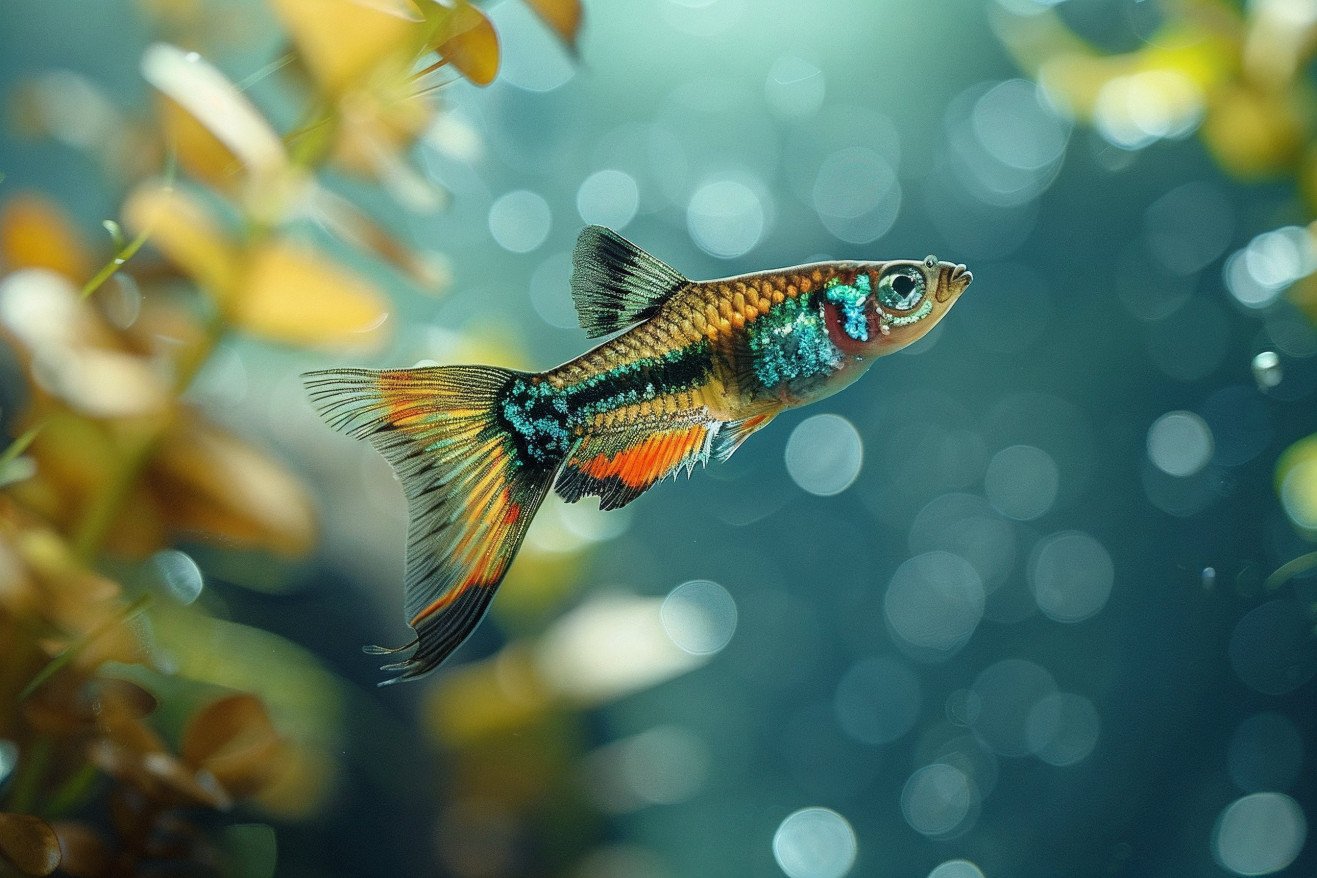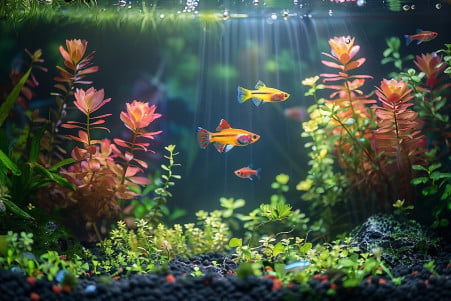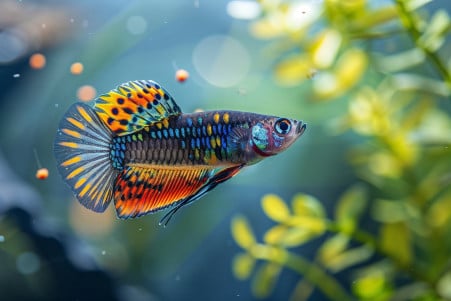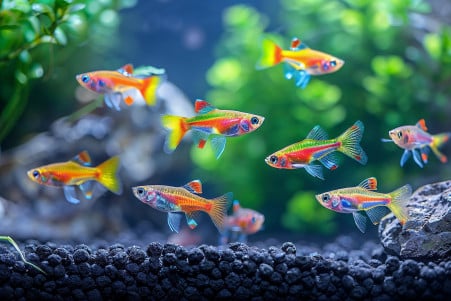How Long Do Guppies Live? Exploring the Lifespan in Home Aquariums
17 February 2024 • Updated 16 February 2024

Guppies are a common sight in many aquariums, but how long can you expect these small, colorful fish to live in your tank? When kept in captivity, guppies generally live between 2 and 5 years if they are well taken care of. However, there are a number of factors that can affect their lifespan, including genetics, diet, water quality, and stress, and in some cases, selective breeding can even increase their life expectancy.
In order to better understand how long guppies live, we will look at a wide range of scientific research, including studies in genetics, ethology, and aquatic veterinary science. These research projects will help us understand the role that selective breeding, stress, and environmental factors play in the health and longevity of these popular fish.
By bringing all of this information together, we hope to offer a well-rounded view that will enable you to better care for and potentially lengthen the lives of your guppy pets.
How long do guppies live?
The Role of Genetics in Guppy Lifespan Enhancement
The genetics of guppies are a major determinant of their lifespan. Through selective breeding of desirable traits that contribute to overall health and well-being, it may be possible to breed guppies that live longer.
However, this method also has its downsides, including susceptibility to diseases and the negative effects of inbreeding depression.
A study published in ScienceDirect found that genetic differences in lifespan between guppy populations are due to genetic factors that are influenced by predation. Guppies from high-predation populations reach sexual maturity faster and invest more in early reproduction, which often results in shorter lifespans.
On the other hand, guppies from low-predation populations may delay sexual maturity and live longer, indicating that selective breeding could increase life expectancy.
A study in Heredity found that guppy genetics are complex and that life history traits can evolve rapidly and converge in response to environmental pressures. This means that while selective breeding can take advantage of these genetic factors to increase lifespan, it must be done carefully to avoid reducing genetic diversity or introducing deleterious mutations.
This knowledge of genetics can help guppy hobbyists make more informed decisions about how to breed their guppies, focusing on traits like robustness and resistance to disease that can contribute to a guppy’s overall lifespan. Since genetics are so important to a guppy’s life history, another important factor in helping to ensure a long life is a balanced and nutritious diet.
Feeding Guppies for Long Life
A healthy diet is one of the most important factors in guppy growth, health, and longevity, making it a key component of their overall well-being.
To make sure your guppies are as healthy as possible, start with a base of high-quality flakes or pellets to make sure they get all the necessary nutrients. Then, make sure to supplement with high-protein treats like bloodworms and brine shrimp to make sure they get the variety in their diet that they would in the wild.
The consequences of a poor diet are dire. Aquarium Source explains that if guppies aren’t getting the nutrients they need from their food, their immune system will be compromised, and they will be more likely to get sick and have a shorter life span. Meanwhile, Fishkeeping Advice says that a low-quality diet can weaken guppies and shorten their life span.
Make sure to feed your guppies two small meals a day to keep them healthy, and make sure they eat all of their food within a few minutes to avoid overfeeding and keep the water quality high. If you follow these dietary guidelines, you can make sure your guppies live long, healthy lives free from the negative effects of malnutrition and disease.
The Impact of Stress on Guppy Longevity
Stress has a profound impact on the health and lifespan of guppies. Guppies experience a range of stressors, including environmental stressors like changes in water temperature and social stressors like overcrowding and aggression from other fish in the tank.
Studies have shown that guppies respond to these stressors by changing their cortisol levels, which is a key part of their stress response. A study in eLife even found that the genetic basis of guppies’ behavioral and endocrine responses to stress are linked, meaning that guppy stress responses can be controlled through selective breeding.
In addition, as noted in Functional Ecology, guppies have individual stress responses, with some guppies showing more stress resilience than others. This individual variation in stress responses and its consistency across different stressors is important to consider when it comes to guppy welfare.
To minimize stress in guppy tanks, hobbyists should make sure to keep an eye on tank conditions, maintain consistent water parameters, and provide enough space and hiding places to avoid social stress. Doing so will help hobbyists maintain a calm environment that will support the health and longevity of these colorful fish.
Building a Healthy Guppy Habitat for Long Life
Guppy life expectancy is closely tied to their environment. Therefore, maintaining high water quality in a home aquarium is critical to helping guppies live as long as possible.
WebMD notes that guppies can live in water that is between 64.4 and 82.4F, but they will be most comfortable in water that is between 70 and 82F, which is similar to their natural environment. It is also important to maintain the correct pH for guppies, which is between 7.0 and 8.0, to help them maintain their health and avoid diseases.
Aquarium Co-Op’s care guide also notes that a clean and stimulating environment that includes live plants and hiding spots can make a big difference in the health of guppies. This will help them feel more at home, reduce stress, and encourage natural behaviors.
Fishkeeping World warns that guppies are prone to a number of diseases, including protozoan infections and fin rot. To help prevent these diseases, it is important to keep the tank clean, watch for signs of illness, and treat any problems that arise.
Regularly checking for diseases and other health problems and keeping the tank clean and stable are important for ensuring that your fish live long and healthy lives.
By making sure that these environmental and care-based needs are met, you can create a healthy aquatic environment that will help your guppies live as long as possible. This will also help you take a more holistic approach to pet care.
The Road to a Long and Healthy Guppy Life
Throughout our investigation into guppy lifespans, we’ve wound our way through the complex genetics, the importance of nutrition, the often hidden impact of stress, and the critical nature of environmental factors.
Genetics is the foundation of the guppy’s life, from the genetic makeup that can make them more or less likely to live long lives to the genetic manipulation that can either help or harm their health. The findings of one study also show that guppies benefit from a varied diet and clean water.
Meanwhile, wikiHow stresses the importance of a clean, roomy tank and regular upkeep to help ensure a guppy’s health and longevity.
By following the comprehensive tips outlined in this article, you can set up a watery paradise that not only helps your guppy live a longer life but also ensures that they live a life that’s full of health, energy, and vitality.
As the stewards of these delightful fish, it’s our pleasure and our duty to ensure that their all-too-brief passage through life is as healthy and joyful as possible. Let’s apply the lessons we’ve learned and embark on the rewarding path of guppy ownership, where we can positively impact our fish’s lives every single day.


